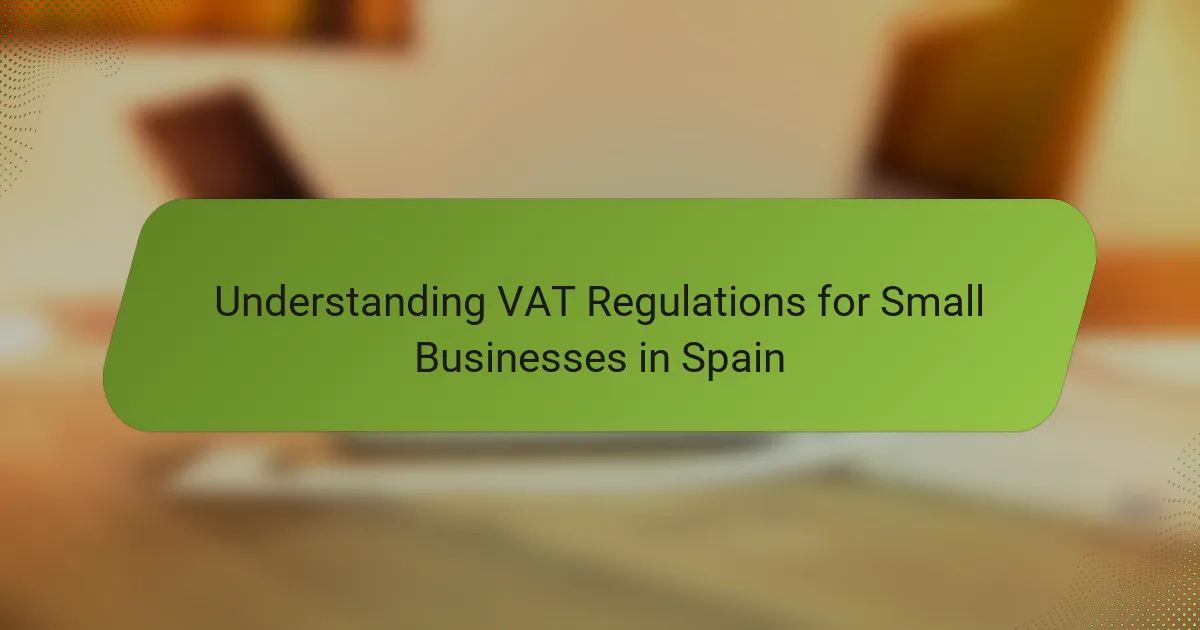Small businesses in Spain must navigate specific VAT regulations that significantly affect their operations and pricing strategies. Understanding the various VAT rates and potential exemptions is essential for compliance and effective financial planning, while proper registration with tax authorities is crucial for charging and reclaiming VAT. Staying informed about common compliance issues can help avoid penalties and financial setbacks.
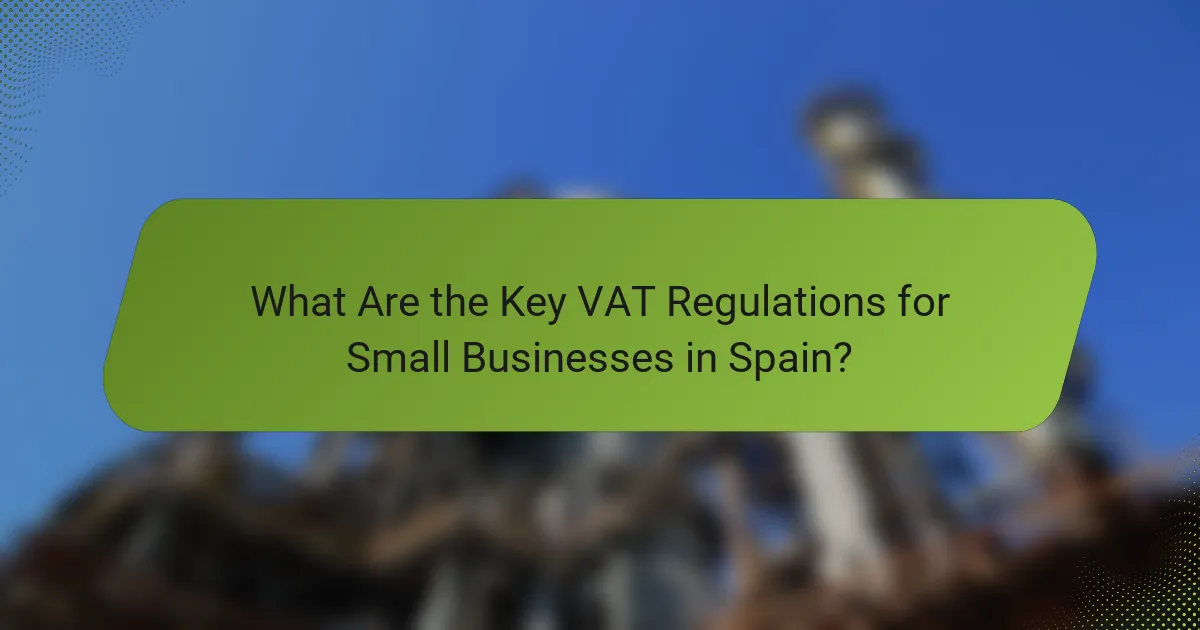
What Are the Key VAT Regulations for Small Businesses in Spain?
Small businesses in Spain must navigate specific VAT regulations that impact their operations and pricing. Understanding the standard and reduced VAT rates, as well as potential exemptions, is crucial for compliance and financial planning.
Standard VAT rate in Spain
The standard VAT rate in Spain is currently set at 21%. This rate applies to most goods and services, making it essential for small businesses to incorporate this into their pricing strategies. Businesses must charge this rate on their sales and remit it to the tax authorities.
It is important to maintain accurate records of sales and VAT collected, as this will be necessary for filing VAT returns. Small businesses should also be aware of the deadlines for submitting these returns to avoid penalties.
Reduced VAT rates for specific goods
Spain offers reduced VAT rates of 10% and 4% for certain goods and services. The 10% rate typically applies to items such as restaurant services and some cultural events, while the 4% rate is reserved for essential goods like basic food items and certain medicines.
Small businesses should familiarise themselves with the categories that qualify for these reduced rates, as applying the correct VAT rate can significantly affect pricing and competitiveness. Keeping updated on any changes in legislation is also advisable, as these rates can be subject to adjustments.
Exemptions for small businesses
Small businesses in Spain may qualify for VAT exemptions under specific conditions, particularly if their annual turnover is below a certain threshold, typically around €85,000. This means they do not have to charge VAT on their sales, simplifying their accounting processes.
However, opting for exemption can limit the ability to reclaim VAT on purchases, which can impact cash flow. Small businesses should carefully evaluate whether to register for VAT or take advantage of exemptions based on their individual circumstances and growth plans.
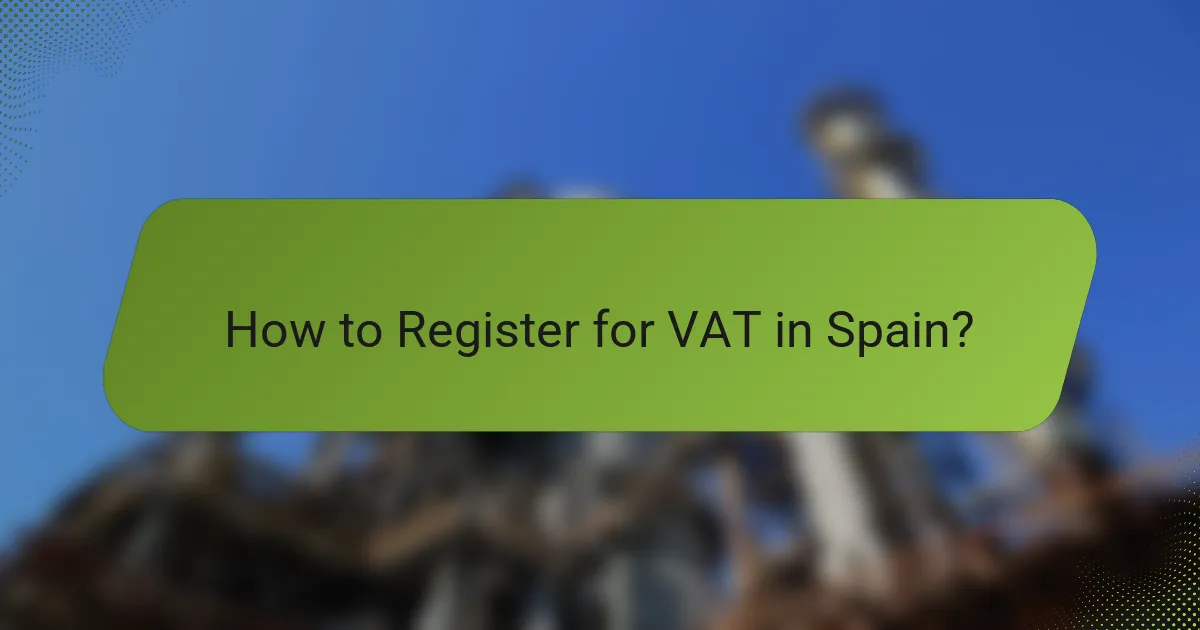
How to Register for VAT in Spain?
To register for VAT in Spain, small businesses must submit specific documentation and complete a series of steps with the tax authorities. This process is crucial for compliance and allows businesses to charge VAT on their sales and reclaim VAT on their purchases.
Required documentation for VAT registration
When registering for VAT in Spain, businesses need to prepare several key documents. These typically include a completed VAT registration form (Modelo 036), proof of identity (such as a passport or national ID), and documentation that verifies the business’s legal status, like incorporation certificates.
Additionally, businesses must provide their tax identification number (NIF) and any relevant accounting records that demonstrate their expected turnover. It’s advisable to have these documents ready to avoid delays in the registration process.
Steps to complete the registration process
The VAT registration process in Spain involves a few straightforward steps. First, businesses should gather all required documentation and fill out the VAT registration form. This form can be submitted online through the Spanish Tax Agency’s website or in person at the local tax office.
After submission, the tax authorities will review the application, which may take a few weeks. Once approved, businesses will receive their VAT number, allowing them to start charging VAT on sales. It’s essential to keep track of deadlines for submitting VAT returns to remain compliant with regulations.
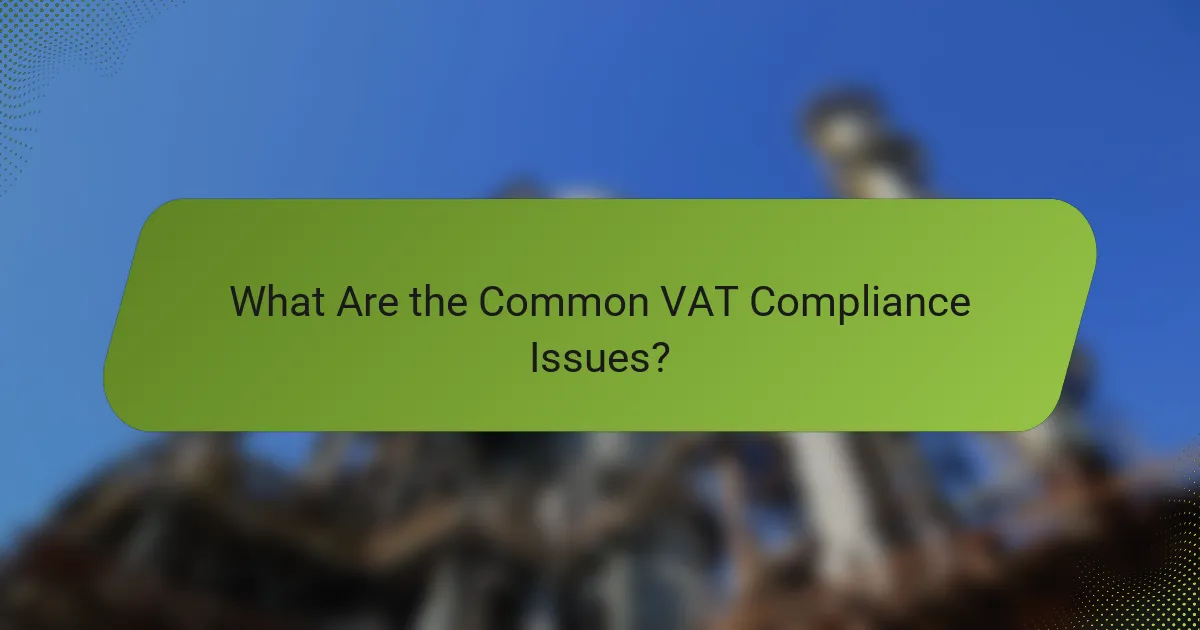
What Are the Common VAT Compliance Issues?
Small businesses in Spain often face several common VAT compliance issues, including missed deadlines, incorrect reporting, and lack of understanding of regulations. These challenges can lead to penalties and financial losses, making it essential for businesses to stay informed and organised.
Filing deadlines for VAT returns
In Spain, VAT returns must typically be filed quarterly or annually, depending on the business’s turnover. Quarterly returns are due by the 20th of the month following the end of each quarter, while annual returns are due by the end of January for the previous year. Missing these deadlines can result in fines and interest on unpaid taxes.
To avoid late submissions, businesses should maintain a calendar of important dates and set reminders well in advance. It’s advisable to prepare VAT returns early to ensure all necessary documentation is in order.
Common mistakes in VAT reporting
Common mistakes in VAT reporting include incorrect calculations, failing to include all taxable sales, and misclassifying expenses. These errors can lead to discrepancies in tax owed and potential audits by the tax authorities.
To minimise mistakes, businesses should implement a robust accounting system that tracks sales and expenses accurately. Regular training for staff on VAT regulations and periodic reviews of submitted returns can also help catch errors before they become problematic.
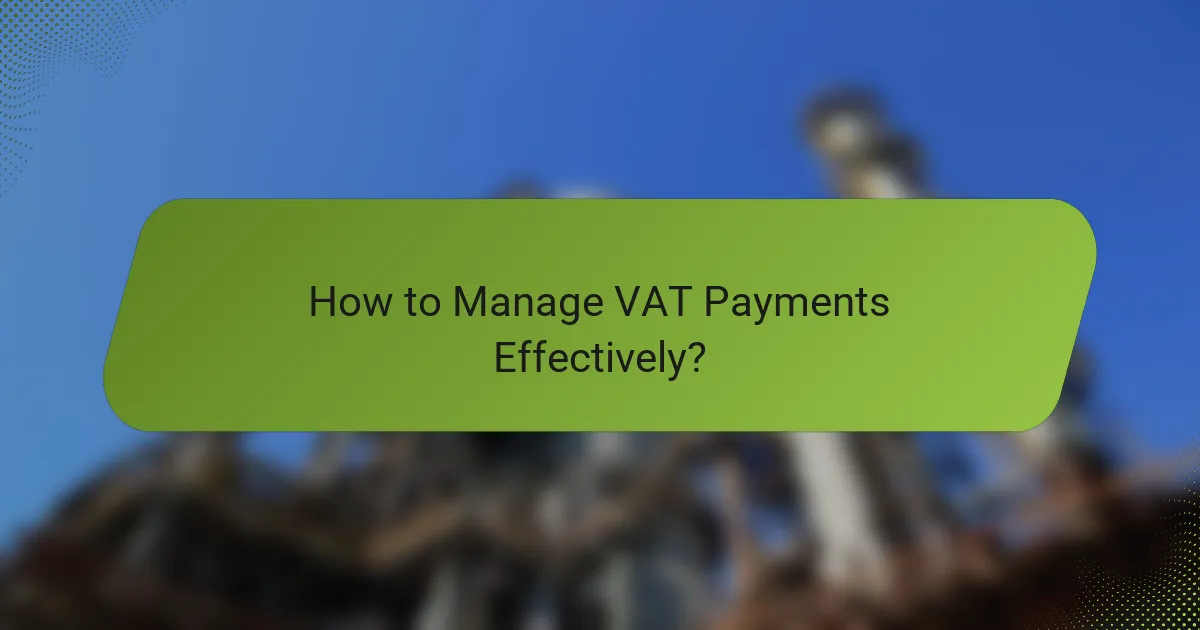
How to Manage VAT Payments Effectively?
Managing VAT payments effectively involves understanding the regulations, choosing appropriate payment methods, and adhering to deadlines. Small businesses in Spain must ensure they comply with VAT laws to avoid penalties and maintain smooth operations.
Payment methods for VAT in Spain
In Spain, small businesses can pay VAT through various methods, including bank transfers, direct debits, and online payments via the Tax Agency’s website. Each method has its advantages; for instance, direct debits can simplify the payment process by automating transactions.
When selecting a payment method, consider factors such as transaction speed and convenience. Bank transfers may take longer to process, while online payments are typically instant. Ensure that you keep records of all transactions for accurate bookkeeping and compliance.
Timelines for VAT payment
VAT payments in Spain are generally due quarterly or annually, depending on the business’s size and turnover. For most small businesses, quarterly payments are standard, with deadlines falling on the 20th of the month following the end of each quarter.
It’s crucial to mark these dates on your calendar to avoid late fees. Additionally, businesses must submit their VAT returns alongside payments, which requires careful preparation of financial records to ensure accuracy and compliance with Spanish tax regulations.
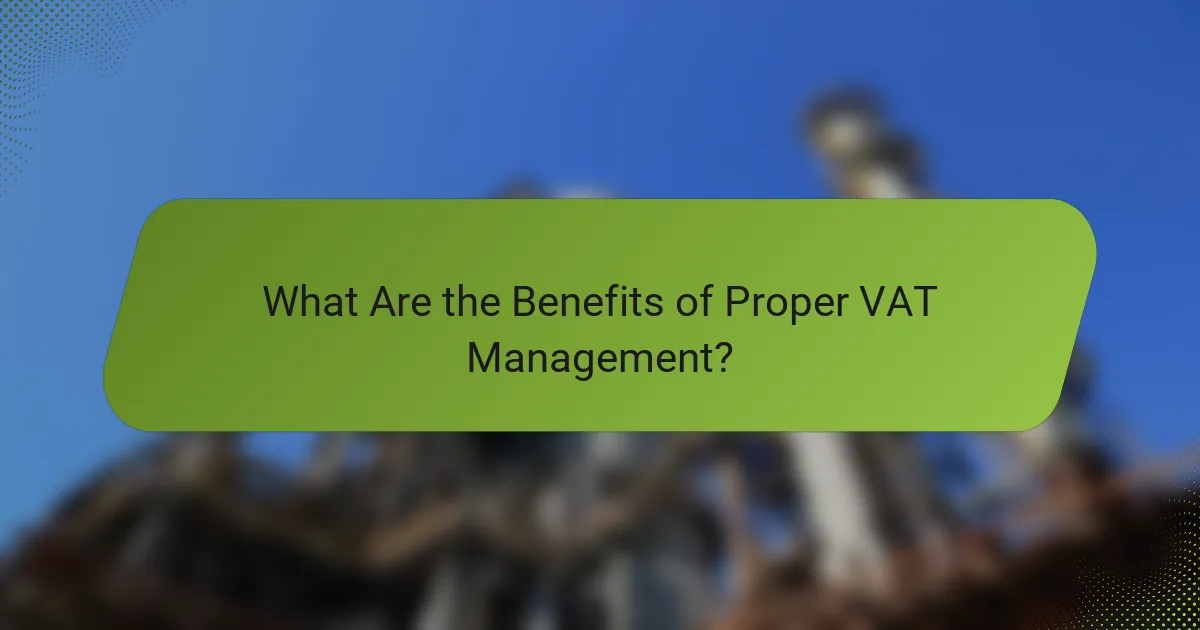
What Are the Benefits of Proper VAT Management?
Proper VAT management offers small businesses in Spain significant advantages, including enhanced cash flow and reduced risk of penalties. By effectively handling VAT obligations, businesses can maintain financial stability and avoid costly mistakes.
Improved cash flow for small businesses
Effective VAT management can lead to improved cash flow for small businesses. By ensuring timely VAT returns and payments, businesses can better predict their cash needs and avoid unexpected shortfalls. For instance, businesses that accurately track VAT input and output can reclaim VAT on purchases, which can provide a much-needed cash boost.
Additionally, understanding the timing of VAT payments can help businesses align their cash inflows and outflows. This means planning for VAT payments around peak revenue periods, allowing for smoother financial management.
Reduced risk of penalties
Proper VAT management significantly reduces the risk of incurring penalties from tax authorities. In Spain, failing to comply with VAT regulations can result in fines that may be a percentage of the unpaid tax or a fixed amount. By keeping accurate records and submitting returns on time, businesses can avoid these costly penalties.
To minimise risks, small businesses should implement a systematic approach to VAT compliance. This includes regular training for staff on VAT regulations, utilising accounting software for accurate tracking, and conducting periodic audits to ensure adherence to the law.
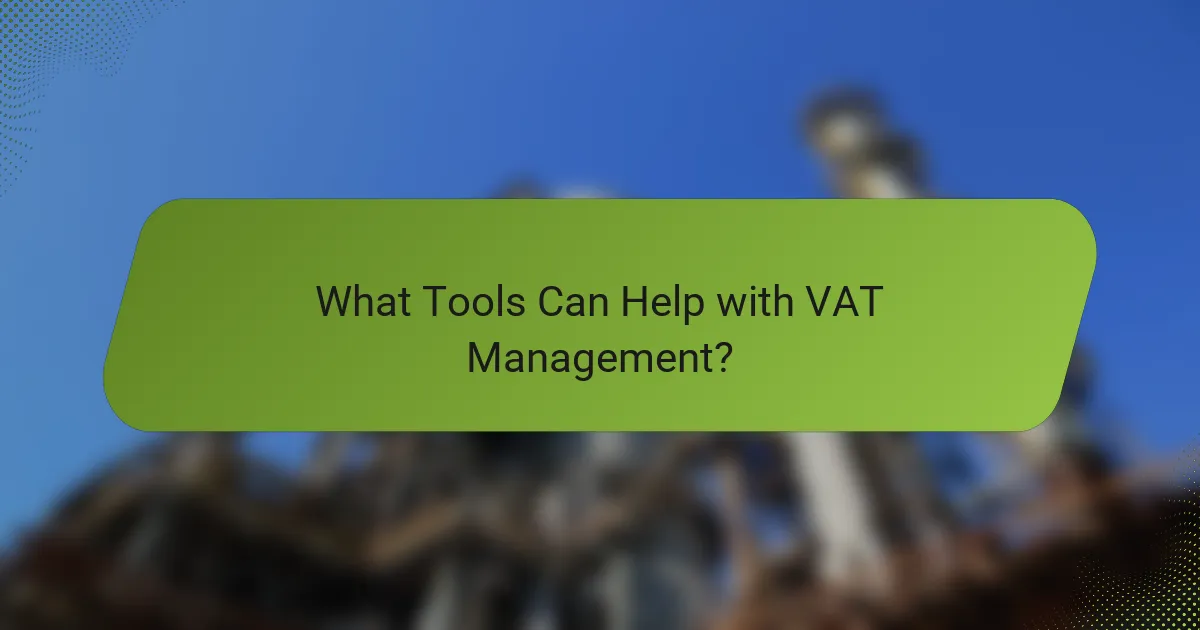
What Tools Can Help with VAT Management?
Several tools can assist small businesses in Spain with VAT management, including accounting software and specialised VAT services. These tools streamline the process of tracking, calculating, and reporting VAT, ensuring compliance with Spanish regulations.
Accounting software options for VAT
Accounting software can significantly simplify VAT management for small businesses. Popular options like Sage, QuickBooks, and Xero offer features specifically designed for VAT tracking, including automatic calculations and reporting templates tailored for Spanish tax regulations.
When selecting accounting software, consider factors such as ease of use, integration with existing systems, and customer support. Many software providers offer free trials, allowing businesses to test functionality before committing.
VAT management services in Spain
VAT management services can provide expert assistance for small businesses navigating the complexities of VAT compliance in Spain. These services typically include VAT registration, preparation of VAT returns, and advice on VAT deductions and exemptions.
Using a VAT management service can save time and reduce the risk of errors, especially for businesses unfamiliar with Spanish VAT laws. It’s advisable to choose a service with a good reputation and experience in your industry to ensure tailored support.
